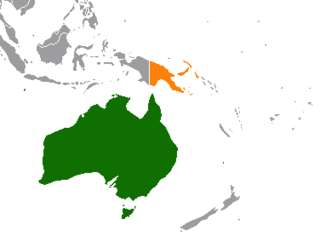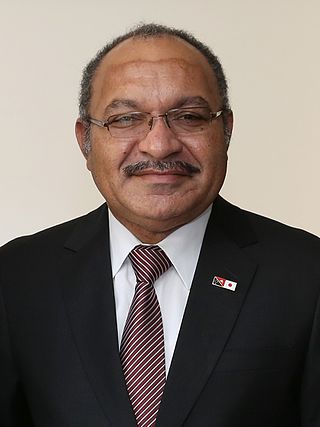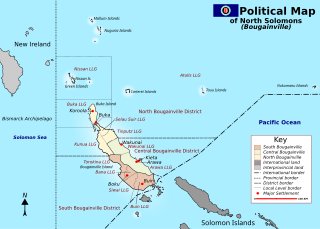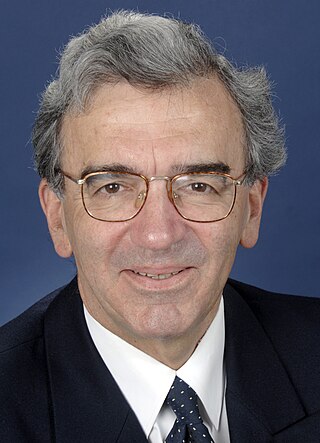Related Research Articles

Papua New Guinea's foreign policy reflects close ties with Australia and other traditional allies and cooperative relations with neighboring countries. Its views on international political and economic issues are generally moderate.

The Pangu Pati, officially Papua na Niugini Yunion Pati, is a nationalist and developmentalist political party on the centre-left in Papua New Guinea. The party is the oldest political party in Papua New Guinea and has held all levels of government throughout its history. As of 2023, it is the largest party in the National Parliament.

The Pacific Solution is the name given to the government of Australia's policy of transporting asylum seekers to detention centres on island nations in the Pacific Ocean, rather than allowing them to land on the Australian mainland. Initially implemented from 2001 to 2007, it had bipartisan support from the Coalition and Labor opposition at the time. The Pacific Solution consisted of three central strategies:

Australian Aid is the brand name used to identify projects in developing countries supported by the Australian Government. As of 2014 the Department of Foreign Affairs and Trade (DFAT) has been responsible for Australia's official development assistance to developing countries.
In early 2006, a furore erupted in Indonesia over the Australian government's decision to grant temporary protection visas to 42 Indonesian asylum seekers from West Papua region. The controversy caused diplomatic tension as well as a "war of cartoons", with newspapers in Indonesia and Australia trading hits over a decision that the Indonesians say questions the sovereignty that they officially have over West Papua.

Australia and Indonesia have established diplomatic relations since 1949, when Australia recognised Indonesia's independence. Historically, contact between Australians and Indonesians began as early as the 16th century prior to the arrival of the Europeans, through Makassan interactions with indigenous Australians on Australia's western and northern coasts.

Sir Michael Thomas Somare was a Papua New Guinean politician. Widely called the "father of the nation", he was the first Prime Minister after independence. At the time of his death, Somare was also the longest-serving prime minister, having been in office for 17 years over three separate terms: from 1975 to 1980; from 1982 to 1985; and from 2002 to 2011. His political career spanned from 1968 until his retirement in 2017. Besides serving as PM, he was minister of foreign affairs, leader of the opposition and governor of East Sepik Province.

Foreign relations exist between Australia and Papua New Guinea. Papua New Guinea is Australia's closest neighbour and a former colony of Australia. Both nations share the same continent in the Oceania region. Papua New Guinea has developed much closer relations with Australia than with Indonesia, the only country with whichuaqh it shares a land border. The two countries are Commonwealth realms. In contemporary times, Papua New Guinea is one of the largest recipients of Australian aid. Some critics have pointed to instances where this has led to an outsized Australian influence on Papua New Guinea politics.

Indonesia–Papua New Guinea relations are foreign relations between Indonesia and Papua New Guinea, two bordering countries north of Australia.
Elizabeth Josephine "Liz" O'Neill was an Australian public servant and diplomat.

Philip James Flood is a distinguished former Australian diplomat and a former senior public servant. The highlights of Flood's career include Secretary of the Department of Foreign Affairs and Trade and former High Commissioner to the United Kingdom. He was also Ambassador to Indonesia, Director-General of the Australian Agency for International Development, Director-General of the Office of National Assessments, and Head of the Inquiry into the Australian Intelligence Community.

The enlargement of the Associationof Southeast Asian Nations is the process of expanding the Association of Southeast Asian Nations (ASEAN) through the accession of new member states. This process began with ASEAN's five original members, who founded the association through the signing of the Bangkok Declaration in 1967. Since then, the ASEAN's membership has grown to ten with the accession of Cambodia in 1999.

Peter Charles Paire O'Neill is a Papua New Guinean politician who served as the seventh Prime Minister of Papua New Guinea from 2011 to 2019. He has been a Member of Parliament for Ialibu-Pangia since 2002. He was a former cabinet minister and the leader of the People's National Congress between 2006 and 2022. He resigned his position as prime minister to avoid a vote of no confidence, and he was succeeded by James Marape.
Allan Robert Taylor was an Australian diplomat, best known for his service as Director-General of the Australian Secret Intelligence Service from 1998 to 2003.

The Development Policy Centre (Devpol) is an aid and development policy think tank based at the Crawford School of Public Policy in the College of Asia and the Pacific at the Australian National University. Devpol undertakes independent research and promotes practical initiatives to improve the effectiveness of Australian aid, to support the development of Papua New Guinea and the Pacific Islands region, and to contribute to better global development policy.

The Bougainville conflict, also known as the Bougainville Civil War, was a multi-layered armed conflict fought from 1988 to 1998 in the North Solomons Province of Papua New Guinea (PNG) between PNG and the secessionist forces of the Bougainville Revolutionary Army (BRA), and between the BRA and other armed groups on Bougainville. The conflict was described by Bougainvillean President John Momis as the largest conflict in Oceania since the end of World War II in 1945, with an estimated 15,000–20,000 Bougainvilleans dead, although lower estimates place the toll at around 1,000–2,000.

William John Farmer is a retired senior Australian public servant and policymaker, best known for his time as Secretary of the Department of Immigration and Multicultural Affairs and for his career in the Australian diplomatic service.
Cynthia Banham is an Australian journalist and academic in the fields of political science and international law. Initially working as a lawyer, Banham switched to journalism in 1999, and became foreign affairs and defence correspondent for The Sydney Morning Herald. In 2007, she was on board Garuda Indonesia Flight 200 when it crashed near Adisutjipto International Airport, sustaining injuries which resulted in the amputation of both her legs.
References
- 1 2 Cameron, Deborah (16 March 2007). "Brilliant diplomat fell in love with Indonesia". The Sydney Morning Herald .
- 1 2 3 Davis, Bruce (20 March 2007). "Aid worker's love affair with Indonesia's needy". The Age .
- 1 2 Smiles, Sarah (9 March 2007). "An engaging woman devoted to Indonesians". The Age .
- ↑ Kennedy, Les (9 March 2007). "Australians dedicated to foreign service". The Sydney Morning Herald . Retrieved 18 March 2008.
- ↑ Bhaskara, Harry (21 June 2005). "Acehnese bemoan slow reconstruction". The Jakarta Post .
- ↑ "Brilliant diplomat fell in love with Indonesia - Obituaries". Sydney Morning Herald. 16 March 2007. Retrieved 23 October 2017.
- ↑ Davis, Bruce (8 May 2007). "Head of AusAID Indonesia Confirmed Dead". Australian Agency for International Development. Australian Government; AusAID. Archived from the original on 30 August 2007. Retrieved 18 March 2008.
- ↑ Downer, Alexander (1 May 2007). "Focus - The Magazine of Australia" (PDF). Ministry of Foreign Affairs. Australian Government; AusAID. Archived from the original (PDF) on 21 July 2008. Retrieved 18 March 2008.
- ↑ Smith, Stephen. "Scholarships support emerging leaders in Indonesia and PNG - The Hon Stephen Smith MP, Minister for Foreign Affairs". Commonwealth of Australia. Archived from the original on 1 May 2008. Retrieved 3 May 2008.
- ↑ "PNG duo win Aussie scholarship". Papua New Guinea Post-Courier . 22 March 2008.